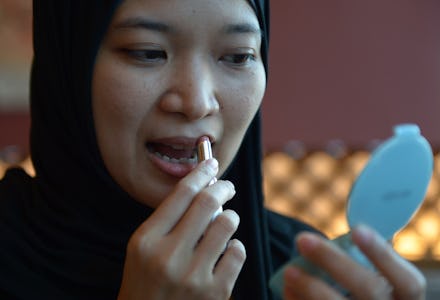Halal Makeup Is the Beauty "Trend" to Pay Attention to Next Year

First there were organic foods. Then there was the host of products with "all-natural" ingredient filling our kitchen cabinets then our medicine cabinets. Soon enough, our makeup started featuring similar kinds of labels, from "vegan" to "cruelty free."
Another label you may start finding on cosmetics these days? "Halal."
What "halal makeup" really means: "Halal" refers to what is permitted or lawful in Islam, and it's most often used in reference to food when it is slaughtered and/or prepared in a way that adheres to the Quran. Halal makeup and cosmetics, though, is a newer phenomenon, with smaller companies starting to identify their products as adhering to Islamic law.
This generally means the makeup is produced without any pork ingredients, like pig fat, which is used in products like lipsticks. According to halal-certified beauty company One Pure Beauty, putting on makeup that has pork-derived ingredients is forbidden since people "must be clean to pray so it is not permitted to pray with forbidden things on you."
The term's expansion to the beauty industry has been part of a broader adoption of halal as a philosophy that applies to whatever the body comes in contact with. But halal makeup is not seen as a strict religious requirement by every Muslim; not all Muslims think beauty and skincare products needs to adhere to halal rules. Moreover, there isn't one single certifying body that regulates halal in the United States, but rather several certifying bodies. (In other countries, like Malaysia or Pakistan, the government may oversee certification.)
The "cruelty-free" beauty train: Still, curiosity about halal products seems to have risen over the past few years. Online searches for "halal makeup" were virtually nonexistent before 2013 and have held a steady interest since, at least based on Google Trends. Market research predicts that the halal makeup market in Saudi Arabia is projected to grow 15% between 2015 and 2020.
Many owners of halal cosmetics companies believe the term applies more broadly to a lifestyle that is ethical. When it comes to the actual makeup, halal products are free of any ingredients that have pork or contain alcohol, but other details vary. Some companies' products are free of ingredients derived from animals, or are also not tested on animals. Some go further and don't include harsh ingredients such as sulfates and parabens.
As a result, many halal products rely on natural ingredients, creating an overlap with products that might qualify as halal without having the specific certification. Take PHB Ethical Beauty, a U.K.-based company that touts its "natural, vegan, cruelty free and halal-certified beauty products."
The halal certification can be a commercial opportunity that entrepreneurs can bank on. Sisters Mauli and Grishma Teli recently founded the first halal cosmetics brand in India, Iba Halal Care, with a focus on selling halal products but also attempting to create a company that is eco-conscious and caters to women, they told Quartz India.
Like other halal makeup, the company's products don't contain alcohol, pork or other ingredients derived from animals and their entire facility is halal certified. The fact that the products are halal is only the first draw for customers, they added.
"Many who visit our store for the first time have a limited understanding of halal, but, once they understand the philosophy and come to know that our products are vegan, cruelty free and devoid of harsh chemicals, they show a keen interest in trying our products," Mauli Teli told Euromonitor.
For Muslim women, the halal products offer them "a peace of mind," she said — a phrase you often hear in connection with "natural" products.
Muslim shoppers finally being recognized: More companies are trying to get halal certification, according to the Business of Fashion, particularly companies with customers in South Asia, where Muslims comprise a large portion of the population.
That was the case with products developed by Japanese company Shiseido that were certified in 2012, for customers in Bangladesh. In 2014, Talent Cosmetic became the first Korean beauty company to acquire halal certification for some products, Business of Fashion reported, to appeal to Malaysian customers.
Meanwhile, small businesses are leading the pack. A search for #halalmakeup on Instagram turns up not only photos of lip glosses and foundation, but also photos of smiling women who've launched their own businesses specializing in halal makeup, like Glow by Claudia Nour. Along with other companies like Amara Halal Cosmetics and One Pure Beauty, these women are finding innovative ways to blend their faith and their love of makeup.
Women like these — stylish, modern and Muslim — are getting noticed more and more by big-time brands. In September, 23-year-old London native Mariah Idrissi became the first hijab-wearing model to model for H&M. Other companies have started releasing special Ramadan holiday collections, as Mango did in May; DKNY followed suit in July.
These companies have realized the buying power of Muslims, with the Muslim market estimated at $2 billion worldwide in 2013 and expected to grow to $3.7 billion by 2019. Global spending on cosmetics by Muslim consumers reached $46 billion in 2013, according to a 2014-2015 report by Thomson Reuters.
"Silicone and wax free, with chamomile extract, lavender water and aloe vera, good for your skin," writes Claudia Nour in the caption describing a liquid foundation on her Instagram, adding that the product is also "whudu friendly," referring to the Muslim tradition of ritual washing. The photo has 55 likes.